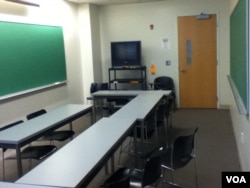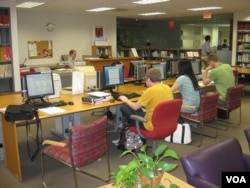By the end of this semester I will have a total of seven graduate-level classes under my belt.
Although different professors have had different teaching styles, I think I’m finally getting used to what to expect from a graduate school political science or history class.
A lot of class discussion
All but one of my graduate school classes have had less than twenty students. Such a small class size means that participation in class discussions is often a large part of our final grade (about 20-25%). Even if it isn’t, our professors always make clear that they expect us to actively raise points and engage with one another in class.
This is different from my undergraduate social science courses. My graduate school classes have been more focused on discussion than lectures, and professors see their role more as discussion facilitators.
In most classes, the professor contextualizes the assigned readings for the week, poses questions for discussion, keeps the class focused on the subject, and provides key interjections and commentary when needed.
The professors who did this well have been some of the best I’ve ever had. I really admire the ability to create a learning environment in which a student feels engaged not only with his teacher but also with his classmates.
Of course, the dark side to this teaching style is that some professors (I’ve had one in particular) will spend 95% of class sitting silently without giving enough guidance to the students.
Hundreds of pages of reading per week
Professors expect students to arrive well-prepared to class and offer insightful comments on the topic of the week. This usually means there is a lot of reading assigned each week.
I have never heard of a graduate-level class in political science or history that didn’t assign at least 150-200 pages of reading per week. My most demanding class last semester assigned about 350 pages a week.
The trade-off is that the total number of written assignments is comparatively low. The same professor who assigned 350 pages of reading a week assigned only two written assignments for the whole semester (each worth 50% of our total grade). Most of my other professors have only assigned two or three big papers for the semester.
These written assignments usually make up the bulk of what we’re graded on. Only in one of my classes have I been assigned an in-class final exam, and only in two of my classes have I been assigned an oral presentation.
An emphasis on original research
Of my written assignments for each class, at least one of them was usually a research paper, or if not exactly a research paper then something that required extensive outside research. This is because, as a few of my professors have said, graduate students are expected to strive for originality.
My Chinese politics professor would only give an “A” for a research paper he considered of publishable quality. In other words, it had to make an original contribution to the field.
Research papers are challenging because they are the one part of the curriculum that falls completely outside the classroom. It’s tough to be disciplined when, unlike with assigned readings, I am not expected to speak about my research every week in front of my classmates. In addition, locating primary source documents for independent research can be time-consuming, especially when I have to specially order them through the library.
At the same time, most of my professors have been great about offering support and advice during office hours and through email. They encourage students to reach out to them to discuss their research.
I think communication with professors is an often overlooked part of what it takes to thrive in a graduate school course. After all, I only see each professor for an hour and fifty minutes in class each week. Consulting with them outside the classroom has been an important part of my learning process.







